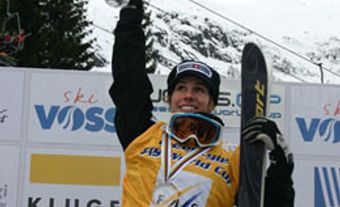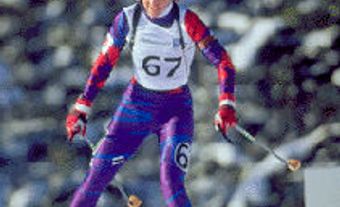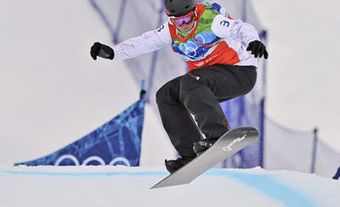
Early Life
Shirley and Sharon Firth were born in Aklavik, Northwest Territories, and spent their early years in a log house with their mother (a member of the local Gwich’in First Nation), their father (a Loucheaux-Métis), and their ten siblings. When the girls were still children, the federal government relocated the small community to nearby Inuvik, which had been constructed due to concerns about flooding and erosion in Aklavik. Like many other children in the area, the twins were taught at an early age how to trap and hunt by their parents.
Territorial Experimental Ski Training Program
Father Jean-Marie Mouchet, a French Catholic missionary priest, was impressed by the athletic potential of the hunters and trappers of the far north. With federal funding, he established the Territorial Experimental Ski Training Program (TEST), with the intention of motivating Indigenous youth and building their leadership skills. The federal government believed that TEST would promote amateur sport in the country, and that it would help integrate Indigenous youth into mainstream Canadian society. TEST was first established in Old Crow, Yukon, but soon expanded to Inuvik.
The Firth sisters were introduced to cross-country skiing through the TEST program, which required the young skiers to train for hours outside; in winter, they skied in complete darkness in temperatures as low as 40 degrees below zero, and in summer, they logged long runs across the tundra, battling fatigue and mosquitos. Motivated in part by their desire to see the world, the Firth sisters worked hard to make the elite team, coached by Norwegian Bjorger Petterson, and soon started competing in national and international competitions.
National and International Success
Success came quickly, with the Firth sisters winning silver (Shirley) and bronze (Sharon) medals in their national debut at the Canadian Junior Cross-Country Championships in 1968. The following year brought gold for both sisters in various cross-country events in Canada, Alaska, and Sweden. The Firth twins dominated Canadian cross-country skiing from the late 1960s to the mid-1980s, capturing 48 Canadian championships, and 79 national medals overall: Shirley won 42 national championship medals (29 gold, 10 silver, and 3 bronze), while Sharon won 37 national championship medals (19 gold, 14 silver, and 4 bronze). The sisters also competed in a number of World Championships, as well as in four Olympic Games — Sapporo (1972), Innsbruck (1976), Lake Placid (1980), and Sarajevo (1984). Shirley and Sharon Firth are the only female Canadian skiers to have competed in four consecutive Winter Olympic Games. Although they failed to medal at either the Olympics or the world championships, Sharon’s 26th place in the women’s 5 km race at the 1972 Olympics remains a Canadian best (the event was discontinued after the 1998 Olympics, and was replaced by the 5/5 km pursuit, which was won by Beckie Scott in 2002).
Life after Competition
After they retired from competitive skiing (Shirley in 1984 and Sharon in 1985), the sisters’ paths diverged. Sharon settled in Yellowknife, NWT, and eventually became a Youth Program Advisor for the government of the NWT, speaking to communities across the NWT. As a firm believer in the positive influence of sport, Sharon has also tried to resurrect the TEST program, which was phased out in the late 1980s.
Shirley and her husband Jan Larsson moved to Paris, where they lived for over 20 years. She earned a teaching certificate from the University of Paris, and lectured on the Dene and Inuit cultures in universities and cultural centres in Scandinavia and central Europe. In 2005, Shirley Firth Larsson moved back to the NWT. At the time of her death from cancer in April 2013 (at age 59), she was Executive Assistant to Jackie Jacobson, speaker of the NWT Legislative Assembly.
Honours
The first Indigenous women inducted into Canada's Sports Hall of Fame, Shirley and Sharon Firth are Members of the Order of Canada and have been inducted into the Canadian Ski Hall of Fame. Sharon received the Order of the Northwest Territories in 2018. Also in 2018, Canada Post issued a stamp in the sisters' honour, and Sharon Firth was named an adjunct professor at the University of Alberta's School of Public Health.
Awards
- John Semmelink Memorial Award (both), Canadian Ski Association (1972)
- Commissioner’s Award (both), Government of the Northwest Territories (1981)
- Members, Order of Canada (1987)
- Inductees, Canadian Ski Hall of Fame, Canadian Ski Museum (1990)
- Golden Jubilee Medal (both) (2002)
- National Aboriginal Achievement Award (now Indspire) (2005) — Sharon Firth
- National Aboriginal Achievement Award (now Indspire) (2006) — Shirley Firth Larsson
- Inductees, NWT Sport Hall of Fame (2012)
- Diamond Jubilee Medal (both) (2012)
- Inductees, Canada's Sports Hall of Fame (2015)
- Inductees, Bow Valley Sports Hall of Fame (2017)
- Honorary Doctor of Laws (Sharon Firth), University of Alberta (2017)
- Order of the Northwest Territories (Sharon Firth) (2018)

 Share on Facebook
Share on Facebook Share on X
Share on X Share by Email
Share by Email Share on Google Classroom
Share on Google Classroom


